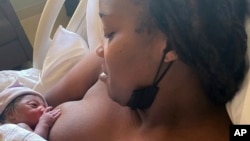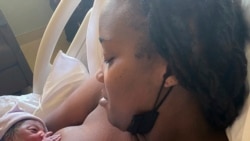A top U.S. pediatricians’ group is making a major policy change about breastfeeding by women with HIV.
The group says women infected with HIV can breastfeed their babies as long as they are taking medications that suppress the virus that causes AIDS.
The new report from the American Academy of Pediatrics (AAP) changes guidance the group had in place since the start of the HIV epidemic in the 1980s.
The group said currently available drugs can reduce the risk of spreading HIV through breast milk to less than one percent, said Dr. Lisa Abuogi. She is a pediatric HIV expert at the University of Colorado and lead writer of the report.
“The medications are so good now and the benefits for mom and baby are so important that we are at a point where it is important to engage in shared decision-making,” Abuogi said.
The drugs are known as antiretroviral therapy. They do not remove all risk of spreading HIV through breast milk. Avoiding breastfeeding is the only sure way to prevent spreading the virus, Abuogi said.
Also, parents must only breastfeed for the babies' first six months. Research shows that switching between breast milk and formula can disrupt an infant's digestion in ways that increase the risk of HIV infection.
About 5,000 people who have HIV give birth in the U.S. each year. Nearly all take drugs to suppress the virus to very low levels, Abuogi said. But viral levels can increase if they do not stay on them.
The medications became widely available starting about 10 years ago. Before then, about 30 percent of HIV infections transmitted from moms to babies occurred during breastfeeding, said Dr. Lynne Mofenson. She is an adviser to the Elizabeth Glaser Pediatric AIDS Foundation. In the early 1990s, about 2,000 infections occurred in U.S. infants each year. Today, it is fewer than 30.
The new AAP policy comes more than a year after government agencies changed their advice. The National Institutes of Health (NIH) and the Centers for Disease Control and Prevention (CDC) changed their recommendations against breastfeeding by people with HIV. The new guidance said people who have viral suppression should be advised about their choices. Those agencies also said that health care providers should not report to child protective services agencies if a parent with HIV seeks to breastfeed.
Research says breastfeeding provides the best nutrition for babies and protects them against sickness and conditions like obesity and type 2 diabetes. Nursing also reduces the mother’s risk of breast and ovarian cancer, diabetes and high blood pressure.
The World Health Organization (WHO) has recommended since 2010 that women with HIV in developing countries breastfeed their infants and have antiretroviral therapy. The guidance weighed the risk of infants getting HIV through breastfeeding and the risk of babies dying from malnutrition, diarrhea and pneumonia. In developing countries, safe replacements for breast milk are often not available.
Dr. Lynn Yee is a Northwestern University women’s health doctor who helped write the NIH guidance. She said experts in developed nations had recommended against breastfeeding. That is because of the wide availability of safe water, formula, and human donor milk, which could remove the risk of HIV infection, Yee added.
That upset people with HIV, who were not given the choice to nurse.
Ci Ci Covin is a 36-year-old from Philadelphia, Pennsylvania. She said she was told she was infected with HIV at age 20. She said she was not permitted to breastfeed her first child, Zion, who is now 13.
Covin said not being able to nurse her son led to postpartum depression. When she became pregnant with her daughter, Zuri, who is now 2-years-old, health care workers helped her breastfeed successfully for seven months. Covin took her medication, and her baby was given drugs to prevent infection.
“Breast milk has everything in it that my baby would need,” Covin said. “That's a beautiful thing.”
Abuogi said the AAP report provides important guidance for pediatricians, nurses and breastfeeding specialists who work with children and families.
Some providers ignored the earlier recommendations and helped women being treated for HIV to nurse their babies. The new guidance should expand such nursing, hopefully quickly, Abuogi said.
I’m Dan Novak.
Dan Novak adapted this story for VOA Learning English based on reporting by The Associated Press.
______________________________________________
Words in This Story
pediatrician — n. a doctor who treats children
benefit — n. a good result that comes from doing a certain thing
engage — v. to carry out or to do
formula –n. artificial mother’s milk
disrupt –v. to interfere with a process or activity
digestion –n. the process of consuming and processing nutrients and removing waste
obesity — n. the condition of being very overweight
nurse –v. to breastfeed a baby
postpartum — adj. taking place after childbirth







Forum